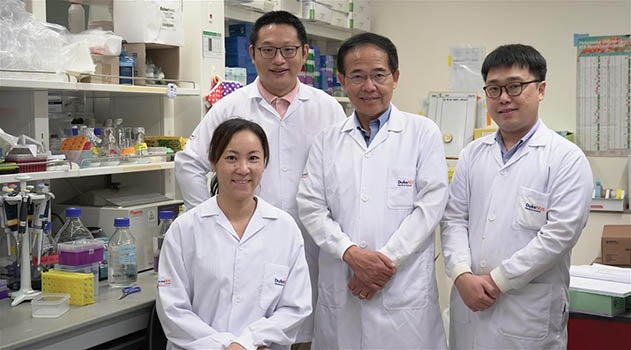
Duke-NUS Professor Wang Linfa (second from right) and his team from the School’s Emerging Infectious Diseases Programme are developing broad-spectrum vaccines and therapeutics against the SARS-Cov-2.
Duke-NUS Medical School has signed an exclusive worldwide licensing agreement with Singapore start-up CoV Biotechnology (CoVBio) to develop broad-spectrum vaccines and therapeutic antibodies that could potentially protect the world’s population from future coronavirus pandemics. Taking this game-changing medical technology a step closer to reality, a novel consensus sequence has been designed to develop vaccine candidates that target not only SARS-CoV-2 and its currently circulating variants of concern (VOCs), but also future VOCs, as well as animal coronaviruses that have the potential of infecting humans—a group of respiratory viruses collectively known as sarbecoviruses.
CoVBio— co-founded by investment firms ClavystBio and Polaris Partners—will bring to market a discovery made by Professor Wang Linfa and his team from Duke-NUS’ Emerging Infectious Diseases Programme. Their findings, published in the New England Journal of Medicine in 2021, showed that 2003 SARS survivors who were vaccinated with the Pfizer-BioNTech mRNA vaccine produced very powerful antibodies capable of neutralising known SARS-CoV-2 VOCs and animal sarbecoviruses.
Sarbecoviruses rely on binding to the ACE2 protein to infect cells. Both SARS-CoV-1 and SARS-CoV-2, as well as a number of coronaviruses circulating in animals such as bats, pangolins and civets, belong to this group.
In exploring the possibility of inducing pan-sarbecovirus neutralising antibodies to block the interaction between the virus and the ACE2 protein, the team has designed a consensus sequence called C1.25 which has been used to produce mRNA and protein subunit vaccine candidates protecting against all SARS-CoV-2 VOCs.
Prof Wang said, “The rapid speed at which SARS-CoV-2 viruses are mutating has posed significant challenges to the current COVID-19 vaccination strategy. Instead of targeting specific variants, our approach is to provide booster shots that can induce pan-sarbecovirus neutralising antibodies to build broad spectrum immunity that protects against not just the current pandemic but future ones as well.”
Besides developing the pan-sarbecovirus mRNA and protein subunit vaccines, Duke-NUS and CoVBio will also be co-developing broad-spectrum therapeutic antibodies as part of this partnership that will offer additional treatment options for people suffering from servere disease.
Dr Rosemary Tan, the incoming CEO of CoVBio said, “By developing our vaccines and therapeutics, we hope to make an important contribution to the current and future pandemic-response capabilities. We are currently in talks with major pharmaceutical companies to bring these products to market as soon as possible.”
Dr David Wang, Director of the Centre for Technology and Development (CTeD) at Duke-NUS, said, “Tapping Duke-NUS’ robust innovation ecosystem, CTeD works closely with our scientists, investors as well as industry partners to accelerate bench-to-bedside research. This is yet another example of an invention of Duke-NUS scientists that has been successfully transferred to industry partners for commercialisation, aiding the battle against COVID-19 and helping guard against future SARS-like outbreaks.”













 Get it on Google Play
Get it on Google Play